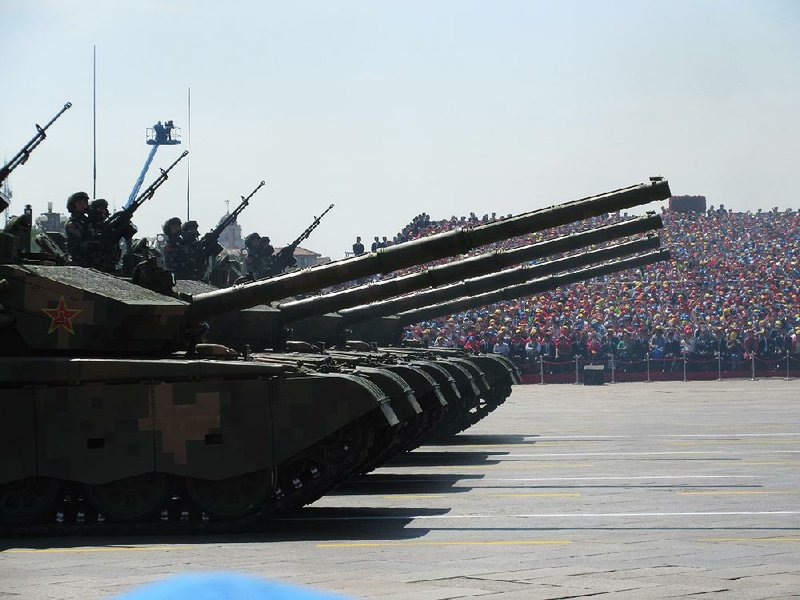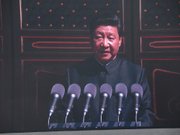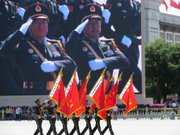While many Arkansans were spending the final days of summer in outdoor pursuits, I was in Beijing, capital of the People's Republic of China, commemorating the "70th Anniversary of the Victory of the World Anti-Fascist War and the Chinese People's War of Resistance against Japanese Aggression" and traversing portions of Zhejiang Province. I was retracing my father's footsteps after his B-25 bomber, the Ruptured Duck, crash-landed off the coast of China in April 1942 following the Doolittle Raiders' bombing of Japan.
My father, David Thatcher, one of two surviving Doolittle Raiders, and I had received an invitation from Cui Tiankai, ambassador for the People's Republic of China to the U.S., to participate in three events on Sept. 3 in Beijing: a morning grand assembly and military parade at Tiananmen Square, a noon memorial reception at the Great Hall of the People, and an evening memorial gala at the Great Hall. Chinese president Xi Jinping would speak at the morning grand assembly and oversee his first military parade since becoming president.
My father turned 94 at the end of July and is no longer able to travel. So I went to represent him, the Doolittle Raiders and the Children of the Doolittle Raiders, Inc. (a non-profit group I lead).
While World War II is a distant memory for many Americans, Chinese feelings toward Japan are still raw. Japan's military involvement in China dates to 1931 with repeated incursions. Full-scale warfare broke out in 1937 when Japan invaded China, four years before the U.S. was drawn into WWII with the bombing of Pearl Harbor. While the U.S. endured four difficult years of war from 1941-1945, China suffered for eight years from 1937--1945 under the yoke of Japanese oppression.
Chinese casualties dwarfed the number of deaths in other countries during WWII, with estimates ranging from 14 million to as many as 35 million, the majority civilians butchered by Japanese soldiers. The U.S. suffered an estimated 418,500 casualties, the majority of them servicemen killed in combat. In China, beheadings, rapes, biological/chemical warfare, medical experiments, bayonet stabbings/disembowelments, mutilations, immolations, drownings, live burials and torture were all tools in the Japanese military's repertoire.
China dominated the headlines in the weeks before my trip, including its currency, the yuan/renminbi, dropping significantly over a three-day period; huge chemical explosions shaking Tianjin, and stock markets worldwide suffering major declines with many blaming the Chinese and their suddenly sputtering economy.
Behind the scenes, political currents were swirling. Xi had invited various heads of state to attend the national day of celebration. The more prominent declined, given China's recent perceived land grab of
disputed atolls/islands in the South China Sea. Thirty heads of state did attend and 49 of the 51 countries invited had representation, including Russian President Vladimir Putin and South Korean President Park Geun-hye. Japan and the Philippines did not send representatives. U.S. Ambassador to China Max Baucus represented the U.S.
I arrived at the Beijing airport on Tuesday, Sept. 1, and was met by Nelson Chen, a representative of the U.S. Division of the Department of American and Oceanian Affairs for the Chinese People's Association for Friendship with Foreign Countries (CPAFFC), the organization that had coordinated my visit. I would stay at the Grand Hyatt Beijing the next three nights.
That afternoon I departed with my friend Melinda Liu, the Beijing bureau chief for Newsweek and daughter of "Honorary Raider" Tung Sheng Liu (who died in 2009), for a meeting at the U.S. Embassy with U.S. Military Air Attache Col. Mark Swentkofske and his assistant Lt. Col. Terry Vance. We later met with Ambassador Baucus, former senior senator from my home state of Montana, and posed for a group photo.
On Wednesday, Sept. 2, the area around our hotel was locked down due to intense security surrounding the next day's parade. But I was able to get out of the hotel for a few hours and take photos of parade displays and other sights. Around 2:30 a.m. Thursday, Sept. 3, I awakened to a rumbling sound. I opened my curtains and looked out on Tiananmen Square, about a quarter-mile away, where tanks and other armored vehicles were being positioned for the parade.
Later that morning our group was driven out to prime seats just off the square to view President Xi, his guests and participants in the parade (approximately 13,000 troops including 1,000 from other countries), 500 pieces of equipment and nearly 200 aircraft. The armaments were Chinese-produced weapons in active service; more than 80 percent had reportedly never been seen in public. China's strategic missile force, the Second Artillery Forces (SAC), displayed seven types of missiles as well as conventional and nuclear missiles. WWII veterans from forces led by both the Communists and the Kuomintang (Nationalists) also participated.
It was sunny, clear, and very hot. The parade opened with the booming of 70 cannons being fired one shot at a time, followed by the image of a swinging pendulum with 10-year periods flashing on a screen beginning with 1945 and ending with 2015. When the clock struck 2015, a gong sounded and the event began at exactly 10 a.m., with Xi addressing the crowd. Following his speech, he walked down to the street, jumped in a black limousine, stood up through the roof, and was driven up and down the parade route, exhorting the troops and later saluting them with his left hand. Once Xi had returned to his vantage point overlooking the proceedings, the parade started. For the next 78 minutes, we were treated to a procession of goose-stepping Chinese soldiers, contingents of foreign troops, and various pieces of Chinese military equipment and aircraft.
After the parade we were taken to the Great Hall where a reception was held. We were fed a six-course dinner with wines, party favors and music by solo artists and groups. Xi welcomed the crowd and recognized many of the foreign dignitaries for their ancestors' assistance in helping China win the Great War. That evening we were treated to an extraordinary theatrical, dramatic and musical presentation titled Victory and Peace in a theater at the Great Hall. Xi and many of the invited dignitaries joined the event. At one point, I was within 25 feet of Xi and Putin when they arrived and left.
The next three days I traversed portions of Zhejiang Province with Melinda Liu, her husband, Alan Babington-Smith, and Zheng Weiyong, who has done extensive research on the Raiders and recently published a book in China on the Doolittle Raid. In Zhejiang I saw a cave where members of Crew No. 15 had hidden from Japanese troops searching for them and visited the beach where my father's plane had crash-landed where I was later given a piece of my father's plane by a local villager. I also toured an exhibition hall in Shipu where a display had been erected for the Doolittle Raiders, saw the restored Enze Clinic in Linghai township where my father's pilot Ted Lawson had his gangrenous left leg amputated and where my father had also stayed, visited the air-raid shelter in a cave in Quzhou where many of the Raiders spent time, toured a city museum in Quzhou which featured an exhibit on the Raiders, and visited the historic "germ warfare" museum in Quzhou, which displayed Japanese "experiments" on Chinese residents with biological and chemical agents.
I came away from my visit marveling at the generosity and humanity of the Chinese, thankful to have seen the places where my father had been, and hopeful in regard to the future of Chinese and American relations. If our leaders could witness the good will of the Chinese people as I had, I think both of our countries would be better off. I was also reminded of something my father had told me about the Chinese while he was there: "They treated us like royalty. They had nothing, but they gave us everything they had."
Jeff Thatcher is a professional communicator and long-time resident of Little Rock.
Editorial on 09/27/2015


